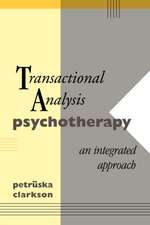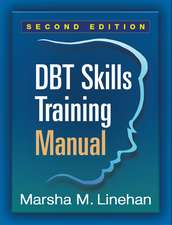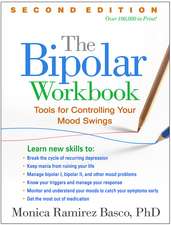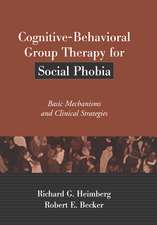Treating Bipolar Disorder: A Clinician's Guide to Interpersonal and Social Rhythm Therapy: Guides to Individualized Evidence-Based Treatment
Autor Ellen Franken Limba Engleză Paperback – 31 mai 2007
| Toate formatele și edițiile | Preț | Express |
|---|---|---|
| Paperback (1) | 259.47 lei 3-5 săpt. | +19.40 lei 10-14 zile |
| Guilford Publications – 31 mai 2007 | 259.47 lei 3-5 săpt. | +19.40 lei 10-14 zile |
| Hardback (1) | 517.02 lei 6-8 săpt. | |
| Guilford Publications – 21 iul 2005 | 517.02 lei 6-8 săpt. |
Preț: 259.47 lei
Preț vechi: 273.13 lei
-5% Nou
49.65€ • 51.98$ • 41.08£
Carte disponibilă
Livrare economică 15-29 martie
Livrare express 04-08 martie pentru 29.39 lei
Specificații
ISBN-10: 159385465X
Pagini: 212
Dimensiuni: 178 x 254 x 15 mm
Greutate: 0.4 kg
Ediția:1
Editura: Guilford Publications
Colecția Guilford Press
Seria Guides to Individualized Evidence-Based Treatment
Public țintă
Professional Practice & DevelopmentNotă biografică
Cuprins
Introduction: Where Interpersonal and Social Rhythm Therapy Came From. The Patients. Empirically Supported Theories of Bipolar Disorder and the Etiology of Bipolar Episodes. Empirically Supported Therapies for Bipolar Disorder. A Brief Overview of Interpersonal and Social Rhythm Therapy. Assessment of Bipolar Disorders and Common Comorbidities. The Individualized Case Formulation: History Taking and the Interpersonal Inventory. Orienting the Patient to Treatment and Individualized Treatment Planning. Symptom Management: Stabilizing Social Rhythms and Behavioral Activation. Intervening in Interpersonal Problem Areas. Intervening: Other Useful Interventions. Monitoring Progress and Enhancing Treatment Adherence. The Therapeutic Relationship in Interpersonal and Social Rhythm Therapy. Poor Outcome and How to Handle It. Tapering or Concluding Treatment. Appendices.
Recenzii
In easy-to-read prose, Ellen Frank explains interpersonal and social rhythm therapy, a new psychosocial intervention for bipolar disorder. Based on her groundbreaking work on the role of sleep-wake cycle disturbances in the onset of mania, Dr. Frank explains how stabilizing people's daily routines can enhance mood stability and interpersonal functioning. She provides step-by-step methods for addressing interpersonal problems associated with the illness, such that clinicians will be well on their way to using the treatment even with their most severely ill patients. The case studies are highly illustrative of the complexities of treating this debilitating illness. There is much wisdom in this book for clinicians and researchers.--David J. Miklowitz, PhD, Department of Psychology, University of Colorado, Boulder
Using a creative combination of techniques, Dr. Frank provides a structure that will allow clinicians to intervene more helpfully with patients with bipolar disorder. A well-written and scientific description of the illness forms the basis for the provision of clear strategies for coping with it more effectively. Rich case examples demonstrate an empathic understanding of the illness and its devastating impact on patients and families. Clinicians working with this population should find this readable, pragmatic book an essential addition to their professional libraries.--Carol M. Anderson, MSW, PhD, Department of Psychiatry, University of Pittsburgh School of Medicine
"Ellen Frank's manual is an important contribution to the treatment of bipolar disorder. It clearly articulates the nature of the illness, how best to conceptualize the role of psychotherapy in a condition whose origins and treatments are primarily biological, how to assess the goals of therapy for an individual patient, and the specifics of utilizing IPSRT. This book is a welcome addition to the field."--Kay Redfield Jamison, PhD, Department of Psychiatry and Behavioral Sciences, Johns Hopkins School of Medicine "In easy-to-read prose, Ellen Frank explains interpersonal and social rhythm therapy, a new psychosocial intervention for bipolar disorder. Based on her groundbreaking work on the role of sleep-wake cycle disturbances in the onset of mania, Dr. Frank explains how stabilizing people's daily routines can enhance mood stability and interpersonal functioning. She provides step-by-step methods for addressing interpersonal problems associated with the illness, such that clinicians will be well on their way to using the treatment even with their most severely ill patients. The case studies are highly illustrative of the complexities of treating this debilitating illness. There is much wisdom in this book for clinicians and researchers."--David J. Miklowitz, PhD, Department of Psychology, University of Colorado, Boulder "Using a creative combination of techniques, Dr. Frank provides a structure that will allow clinicians to intervene more helpfully with patients with bipolar disorder. A well-written and scientific description of the illness forms the basis for the provision of clear strategies for coping with it more effectively. Rich case examples demonstrate an empathic understanding of the illness and its devastating impact on patients and families. Clinicians working with this population should find this readable, pragmatic book an essential addition to their professional libraries."--Carol M. Anderson, MSW, PhD, Department of Psychiatry, Universi
Descriere
An innovative approach developed by the author offers tools for the management of bipolar episodes & preventing their recurrence. The model addresses all three likely episode triggers: not taking medication, stressful events & disruptions in social rhythms.

























